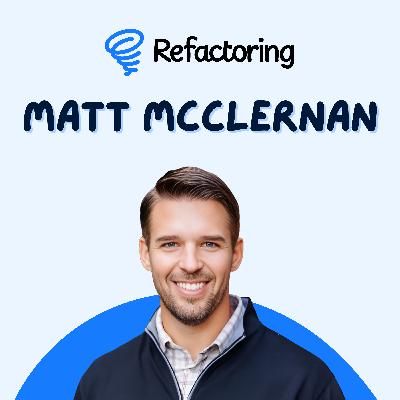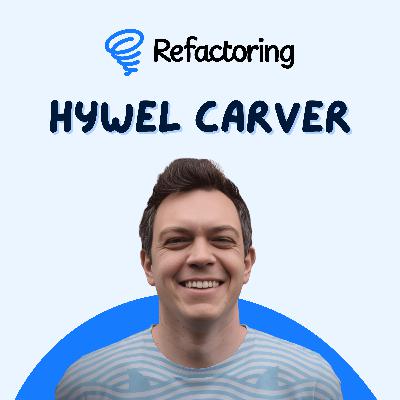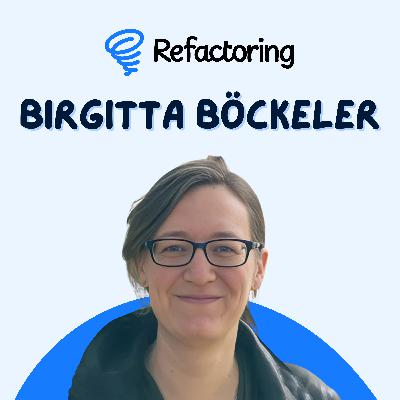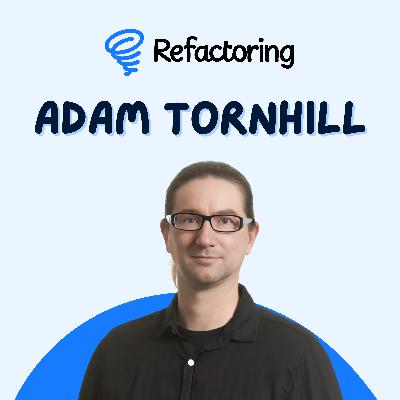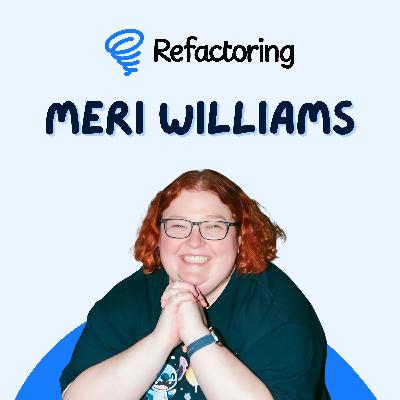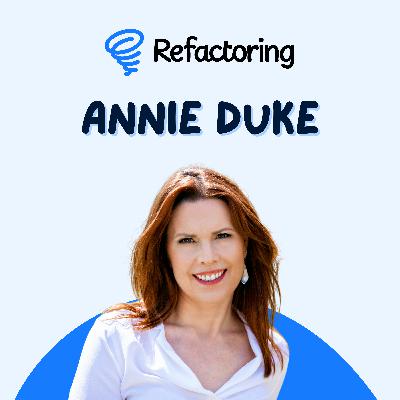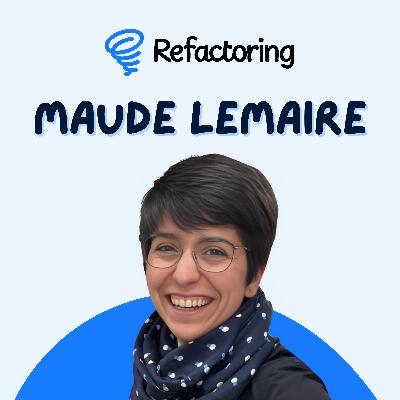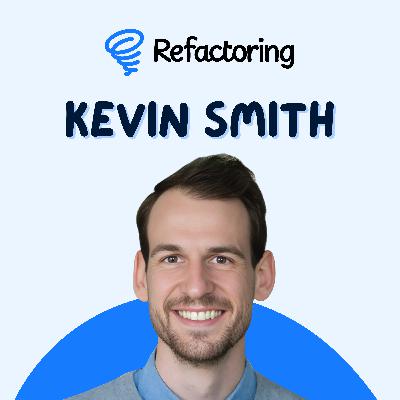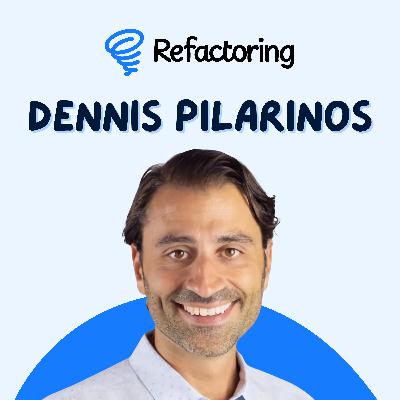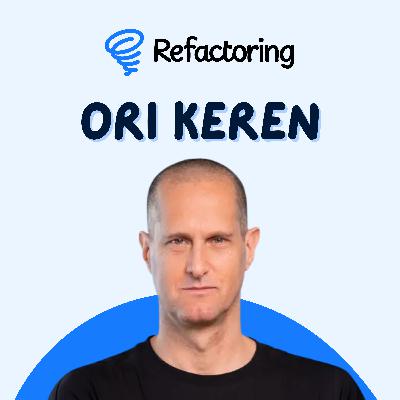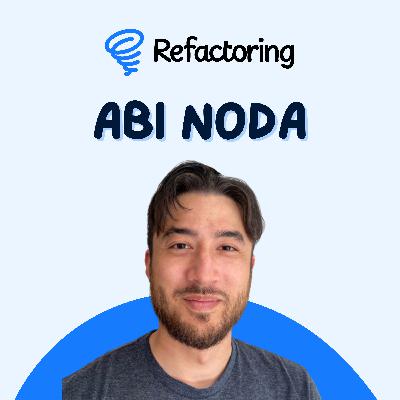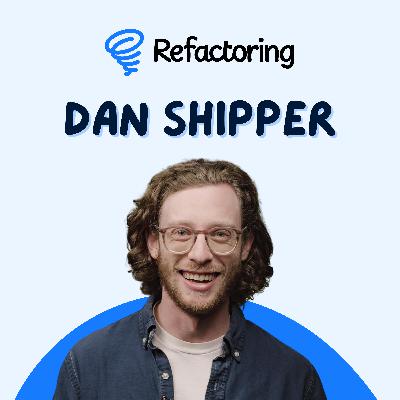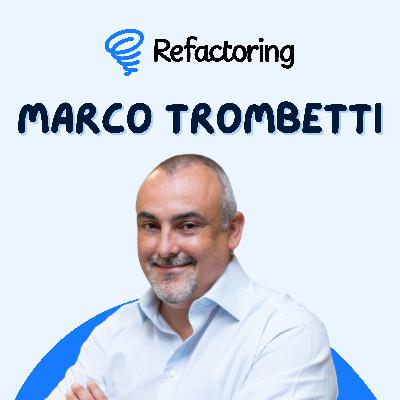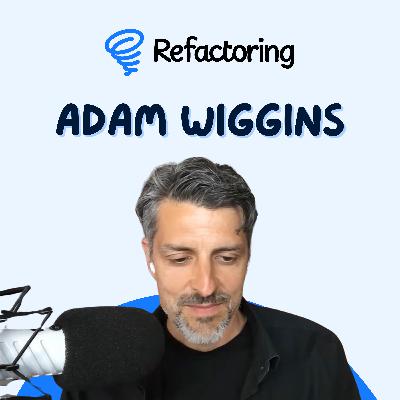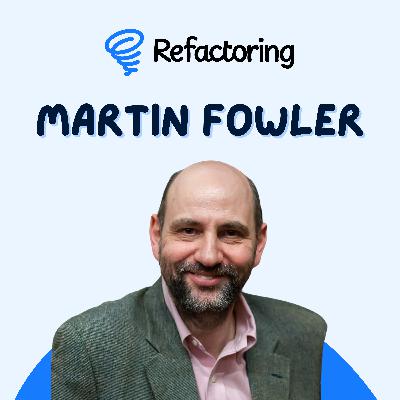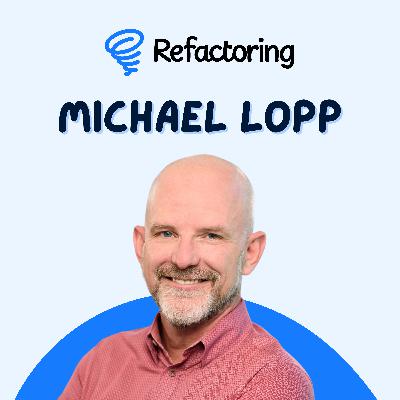Discover Refactoring Podcast
Refactoring Podcast

58 Episodes
Reverse
Today's guest is Matt McClernan, CEO of Augment Code!With Matt, we went through the findings of our own research that we developed together with Augment, surveying more than 400 engineering teams about how they're using AI.And we went through many topics, from the differences between personal and team adoption, challenges, how documentation looks like a secret weapon, how to manage context in AI coding, and much more. And then we talked about the future, how the UX of AI coding is changing with IDEs, CLI tools and agents, and what the future might bring.(00:00) Preview(01:26) Introduction(02:16) Personal vs Team AI Adoption(09:25) The journey of AI adoption(13:06) The role of documentation(18:13) AI and Context: the Augment secret sauce(25:44) Helping AI with context(28:17) Quality control in AI coding(36:30) Companies and AI in the near future(45:54) The state of UX in writing code(51:54) The scope of Augment—This episode is brought to you by Snyk! Join a live session with Vandana Verma Sehgal, OWASP Leader and Staff Developer Advocate at Snyk, on Thursday, December 11, at 11am ETRegister at https://go.snyk.io/12-11-owasp-top-10-isc2.html?utm_source=newsletter&utm_medium=so-sp&utm_campaign=dm_im-refactoring_wbn_251211_owasp-top-10&utm_term=refactoring&utm_content=ad&ref=plug.dev—You can also find this at:• 📬 Newsletter: https://refactoring.fm• 🎧 Spotify: https://open.spotify.com/show/7Luds9dmzZDoDC8Q7EMbSw• 📱 Apple: https://podcasts.apple.com/us/podcast/refactoring-podcast/id1719137305—For inquiries about sponsoring the podcast, or appearing as a guest, email: luca@refactoring.club
Today's guest is Rob Zuber, CTO of CircleCI!With Rob, we talked about software delivery, the impact of AI, and how to build great product engineering teams. And next, we discuss trade-offs between standardization versus flexibility in software organizations, and lessons learned from our respective past mistakes.(00:00) Preview(01:22) Introduction(03:33) Industry Changes and AI's Impact on Development(08:59) The Bell Curve of Metrics and Team Performance(12:09) From Engineering Metrics to Business Outcomes(14:31) Building Effective Small Teams(25:35) Experience vs. Curiosity(37:18) Scaling Challenges and Technology Decisions(49:26) Organizational Standards and Leadership Philosophy—This episode is brought to you by Codacy! Codacy helps developers save time in code reviews, so developers can focus on other things.Start your free trial and get 20% off your first 3 months at codacy.com/refactoring—You can also find this at:• 📬 Newsletter: https://refactoring.fm• 🎧 Spotify: https://open.spotify.com/show/7Luds9dmzZDoDC8Q7EMbSw• 📱 Apple: https://podcasts.apple.com/us/podcast/refactoring-podcast/id1719137305—For inquiries about sponsoring the podcast, or appearing as a guest, email: luca@refactoring.club
Today's guest is Hywel Carver! Hywel is co-founder and CEO of Skiller Whale, which provides live team coaching for software engineering teams. With Hywel, we got deep into what makes traditional developer training awful, what engineers truly learn and what they should learn. Then we explored how to measure the impact of learning and how AI may possibly change both how learning works and our own skills.(00:00) Preview(01:15) Introduction(02:22) Hywel's journey in tech(06:20) Spreading good learning(07:55) Training as a compliance(09:34) The effectiveness of learning(12:42) Training with an expert(18:02) Knowledge, Skill and Wisdom(24:16) How Skiller Whale works?(30:26) The outcomes(34:53) Finding the proper learning method(40:12) Measuring learning value(46:54) AI, humans and code bases—You can also find this at:• 📬 Newsletter: https://refactoring.fm• 🎧 Spotify: https://open.spotify.com/show/7Luds9dmzZDoDC8Q7EMbSw• 📱 Apple: https://podcasts.apple.com/us/podcast/refactoring-podcast/id1719137305—For inquiries about sponsoring the podcast, or appearing as a guest, email: luca@refactoring.club
Today's guest is Darragh Curran! Darragh is the CTO of Intercom, which is one of the world's leading customer service products with more than 600 million users.With Darragh, we talked about how AI poses at the same time an existential risk and an incredible opportunity for Intercom, and how this led them to the decision of creating a completely separate product and deflect most team resources to it. Then we discussed how AI is being adopted inside Intercom itself to achieve Darragh's ambitious goal of doubling the team's productivity.And finally, we explored Darragh's own role as CTO and what he believes he needs to get right to make all of this happen. (00:00) Preview(01:31) Introduction(02:19) How Intercom changed with AI(07:02) Intercom and Fin(11:37) AI productivity gains(16:36) Measuring productivity increase(25:06) Experience and AI(31:02) AI in large and legacy systems(32:47) The CTO role in an AI framework(38:56) Good for human = Good for AI(42:03) Improving AI models: Fin's case(45:03) How Fin improved so fast(49:08) One big challenge—You can also find this at:• 📬 Newsletter: https://refactoring.fm• 🎧 Spotify: https://open.spotify.com/show/7Luds9dmzZDoDC8Q7EMbSw• 📱 Apple: https://podcasts.apple.com/us/podcast/refactoring-podcast/id1719137305—For inquiries about sponsoring the podcast, or appearing as a guest, email: luca@refactoring.club
Today's guest is Meg Adams!Meg is Senior Director of Engineering for the New York Times. With Meg, we talked about her fantastic journey in tech, from management in sales and retail, to learning software development from scratch, to management again, but this time in technology. And then we especially talked about Neuro Leadership, what it is, how you can apply it in practice in your team processes, and how things are different for ICs versus managers, and how you scale all of this to your whole organization.(01:22) Introduction(01:38) Meg's journey in tech(06:03) Managing skills in individual contribution(09:32) What is Neuroleadership?(11:06) Neuroleadership in tech(14:12) The SCARF model(21:18) Applying the SCARF(27:29) Designing good communication(30:42) Psychological safety(35:10) Identifying a threat(38:28) Making SCARF model part of a culture(41:27) A good example: Meg's time at Etsy—This episode is brought to you by Augment Code! Augment Code is the only AI engineering platform built for real engineering teams.Learn more at augmentcode.com!—You can also find this at:• 📬 Newsletter: https://refactoring.fm• 🎧 Spotify: https://open.spotify.com/show/7Luds9dmzZDoDC8Q7EMbSw• 📱 Apple: https://podcasts.apple.com/us/podcast/refactoring-podcast/id1719137305—For inquiries about sponsoring the podcast, or appearing as a guest, email: luca@refactoring.club
Today's guest is Birgitta Böckeler!Birgitta is is a distinguished engineer and global lead for AI-assisted software delivery at ThoughtWorks. Her full-time work is to figure out how engineering teams can make the most out of AI.With Birgitta, we talked about her favorite workflows, how she uses AI in the IDE, in the terminal or in a genetic mode. We discussed AI impact on productivity and what the best teams are getting right, which others are not. And finally, we talked about how AI impacts both junior and senior engineers and how we can get the best out of both skeptics and optimists.(01:27) Introduction(04:58) A day in the work of data(11:04) Large and smalls change sets(15:57) The strength of Cloud Code(18:35) Using AI tools in ThoughtWorks(21:41) Figuring AI productive value(27:24) Getting the most out of AI(30:10) AI assistance in large code bases(32:21) Good for humans = Good for AI(39:10) AI and documentation(41:49) Software engineer role in AI landscape(48:24) Junior engineers and learning—This episode is brought to you by Augment Code! Augment Code is the only AI engineering platform built for real engineering teams.Learn more at augmentcode.com!—You can also find this at:• 📬 Newsletter: https://refactoring.fm• 🎧 Spotify: https://open.spotify.com/show/7Luds9dmzZDoDC8Q7EMbSw• 📱 Apple: https://podcasts.apple.com/us/podcast/refactoring-podcast/id1719137305—For inquiries about sponsoring the podcast, or appearing as a guest, email: luca@refactoring.club
Today's guest is Antonia Scheidel!Antonia is Director of Engineering at Duolingo, where she made the whole career progression, starting as a simple intern 12 years ago. Antonia is an expert at designing good, automated processes for your team. We discuss how to create good automation to avoid people doing glue work, how not to become a bottleneck as a manager, and how to make the team own the process and repair it when needed.(01:25) Introduction(02:02) Antonia's journey into tech(03:34) Antonia's career in Duolingo(06:55) From engineering to management(10:19) Good processing and notes(14:18) Fixing the process and team alignment(18:06) The burden of asking(23:08) Invisible work and visible improvements(27:55) Automation trade-offs(33:14) Responsibilities in estabilished processes(37:24) How to do notifications right(49:09) Automation for the sake of relationships(54:33) The "usual suspects" of management—This episode is brought to you by Augment Code! Augment Code is the only AI engineering platform built for real engineering teams.Learn more at augmentcode.com!—You can also find this at:• 📬 Newsletter: https://refactoring.fm• 🎧 Spotify: https://open.spotify.com/show/7Luds9dmzZDoDC8Q7EMbSw• 📱 Apple: https://podcasts.apple.com/us/podcast/refactoring-podcast/id1719137305—For inquiries about sponsoring the podcast, or appearing as a guest, email: luca@refactoring.club
Today's guest is Adam Tornhill! Adam is the author of the popular book Your Code as a Crime Scene, and he's the founder of Code Scene. With Adam, we discussed his unique insights about technical debt and code quality, which come from his study of forensic psychology. We explored how static analysis is not enough to understand code health and why you need to look into version control history to understand hotspots, change distribution and bus factor. And finally, we inevitably talked about AI and how it changes, or maybe does not change, how we should write code.(01:23) Introduction(02:25) Adam's journey into tech(05:58) The crime scene metaphor(08:27) Version control history(10:22) A natural law of software(14:03) Code Red(15:56) Assessing good code health(22:31) Distribution of impact and the bus factor(25:33) Reducing bus factor(29:57) Reassessing knowledge(32:25) The entropy of code bases(34:53) AI in code analysis(39:44) The impact of AI coding(41:58) Preventing technical debt(44:13) The actual developer tool space(46:21) Code data and team ceremonies—This episode is brought to you by Augment Code! Augment Code is the only AI engineering platform built for real engineering teams.Learn more at augmentcode.com!—You can also find this at:• 📬 Newsletter: https://refactoring.fm• 🎧 Spotify: https://open.spotify.com/show/7Luds9dmzZDoDC8Q7EMbSw• 📱 Apple: https://podcasts.apple.com/us/podcast/refactoring-podcast/id1719137305—For inquiries about sponsoring the podcast, or appearing as a guest, email: luca@refactoring.club
Today's guest is Meri Williams, who is the CTO of Pleo and the host of LeadDev conferences for more than 10 years. With Meri, we started by talking about diversity, why it is such a controversial topic, why diverse teams make for stronger teams, and what are the mistakes engineering leaders should avoid. Then we took from her experience with Lead Dev to explore what makes for a good talk, and what Meri looks for when she selects the best ones.And finally, we explored how AI is going to change how we develop engineers and grow junior co-workers.(01:19) Introduction(02:04) Meri's journey into tech(07:29) Conferences, meetups and LeadDev(10:14) Recurring issues in engineering leadership(12:21) Why diversity matters(15:04) A proper diverse environment(22:52) How to create a truly memorable talk(26:25) LeadDev and conferences(28:53) Speaking on stage(30:50) Speaking as a benefit for your career(33:59) Junior engineers in the age of AI(39:37) Is AI a turning point?(44:44) Seniors engineers and AI(46:31) Guiding junior engineers—This episode is brought to you by Augment Code! Augment Code is the only AI engineering platform built for real engineering teams.Learn more at augmentcode.com!—You can also find this at:• 📬 Newsletter: https://refactoring.fm• 🎧 Spotify: https://open.spotify.com/show/7Luds9dmzZDoDC8Q7EMbSw• 📱 Apple: https://podcasts.apple.com/us/podcast/refactoring-podcast/id1719137305—For inquiries about sponsoring the podcast, or appearing as a guest, email: luca@refactoring.club
Today's guest is Annie Duke, who is a former world-class professional poker player and one of the world's top experts on decision-making.She's a bestseller author and coach of many tech founders and teams.With Annie we talked about her journey from studying decision science to becoming a top poker player and back to decision-making. We explored how to make good decisions under uncertainty, alone and in a team. And we particularly focused on quitting decisions, what maked for a good versus a bad quit and why we are so bad at recognizing those.00:01:31 Introduction00:03:45 From poker to decision-making00:08:30 Sponsor00:10:07 Poker and the definition of "resulting"00:16:42 Feedback loops and decision-making00:21:59 Successful but not hungry00:26:14 A good decision-making process00:35:24 Qualifying the market00:38:17 Team decision-making00:47:46 Quitting00:52:43 Make quitting easier01:08:43 Kill criteria—This episode is brought to you by Unblocked! Unblocked brings all the context about your codebase together, so your team gets expert-level answers, no matter where they’re working.Learn more at getunblocked.com!—You can also find this at:• 📬 Newsletter: https://refactoring.fm• 🎧 Spotify: https://open.spotify.com/show/7Luds9dmzZDoDC8Q7EMbSw• 📱 Apple: https://podcasts.apple.com/us/podcast/refactoring-podcast/id1719137305—For inquiries about sponsoring the podcast, or appearing as a guest, email: luca@refactoring.club
Today's guest is Maude Lemaire, who is a principal engineer at GitHub and author of the book, "Refactoring at Scale."With Maude, we talked about her journey in tech, from Rent the Runway to joining Slack and leading its performance engineering team to joining GitHub as a principal engineer. And then we discussed what it means to do refactoring at scale, how to do it right, how to bring people on board, and what are the biggest mistakes you should avoid.00:01:06 Introduction00:02:05 Maude's journey in tech00:08:23 Sponsor00:09:34 Rent a Runway00:12:56 Joining Slack00:15:54 Approaching GitHub00:22:04 Changing company00:26:00 Onboarding in a big tech00:33:02 From data center to cloud00:38:22 A team for a purpose00:49:07 The biggest mistakes in large scale refactoring00:54:34 One big mistake00:57:58 Testing in production01:03:16 Test production: Big tech vs startup—This episode is brought to you by Swarmia! The engineering intelligence platform that serves some of the best software companies in the world.You can get 20% off by booking a demo at swarmia.com/refactoring!—You can also find this at:• 📬 Newsletter: https://refactoring.fm• 🎧 Spotify: https://open.spotify.com/show/7Luds9dmzZDoDC8Q7EMbSw• 📱 Apple: https://podcasts.apple.com/us/podcast/refactoring-podcast/id1719137305—For inquiries about sponsoring the podcast, or appearing as a guest, email: luca@refactoring.club
Today's guest is Kevin Smith, who is co-founder of Snipd, one of the world's most popular podcast apps.With Kevin, we talked about his journey in tech, starting from quantitative finance and then running an AI team in a high-growth startup up to actually founding one with Snipd. Then we segued into talking about Snipd itself and what are the technical challenges of working with AI models all the time. And finally, we discussed the future of learning, what are Kevin's favorite podcasts, what makes them good, and how AI enables personalized learning at scale.01:26 Introduction01:45 Kevin's journey in tech04:18 AI giant leaps07:38 Sponsor08:50 Kevin's transition to founder16:30 What is Snipd?18:20 On AI models21:25 Snipd technical challenges29:49 How to improve quality in AI output31:30 AI in team management and dev processes34:19 AI coding enhancements38:05 Learning with modern tools42:50 Personalize learning with AI45:51 Kevin's favourite podcasts47:58 What makes a good podcast good?—This episode is brought to you by Swarmia! The engineering intelligence platform that serves some of the best software companies in the world.You can get 20% off by booking a demo at swarmia.com/refactoring!—You can also find this at:• 📬 Newsletter: https://refactoring.fm• 🎧 Spotify: https://open.spotify.com/show/7Luds9dmzZDoDC8Q7EMbSw• 📱 Apple: https://podcasts.apple.com/us/podcast/refactoring-podcast/id1719137305—For inquiries about sponsoring the podcast, or appearing as a guest, email: luca@refactoring.club
Today's guest is Dennis Pilarinos, who is founder and CEO of Unblocked. With Dennis, we talked about his journey in tech, which is just incredible, starting from director roles at Microsoft and Amazon, then founding BuddyBuild and later selling it to Apple, and eventually to these days where he founded Unblocked. And later we talked about Unblocked itself, which is one of the few developer AI tools that is specifically not about coding.So we talked about what problem it solves and the hardest tech challenges that the team has to work with.And finally, we discussed the future of DevTools, because Dennis has founded not one, but two companies about it. And this is a time of big transformation, with MCP, AI agents and more.01:48 Introduction02:33 Dennis' journey in tech06:11 Sponsor07:48 Adapting big tech knowledge15:31 Adding context to AI15:29 Managing humans and chaos25:03 AI and hallucination issue27:14 The tipping point of evolution28:33 The future of developer workflow34:25 Increase documentation to increase context33:43 AI: a future without layers36:53 Setting up a new dev team—This episode is brought to you by Swarmia! The engineering intelligence platform that serves some of the best software companies in the world.You can get 20% off by booking a demo at swarmia.com/refactoring!—You can also find this at:• 📬 Newsletter: https://refactoring.fm• 🎧 Spotify: https://open.spotify.com/show/7Luds9dmzZDoDC8Q7EMbSw• 📱 Apple: https://podcasts.apple.com/us/podcast/refactoring-podcast/id1719137305—For inquiries about sponsoring the podcast, or appearing as a guest, email: luca@refactoring.club
Today's guest is Ori Keren, who is CEO and co-founder of LinearB and has more than 25 years of experience in the industry, especially in developer experience and productivity.With Ori, we talked about how AI is infiltrating all the stages of the development process, from coding to testing to code reviews. We discussed how AI is already restructuring teams and how engineering leaders can drive adoption by combining culture, small wins and full moon shots.01:07 Introduction01:59 Development productivity in 202508:29 Code creation process and AI10:46 Coding and bottlenecks15:05 Cognitive unload using AI16:48 The journey of AI adoption21:50 AI native environment24:57 How teams are changing28:35 More AI = More development30:40 The skeptcisim about coding with AI33:50 Removing the toil from coding35:31 AI help outside coding41:50 How to integrate AI in a company44:38 Go with the (AI) flow45:34 Education in prompting—You can also find this at:• Newsletter: https://refactoring.fm• Spotify: https://open.spotify.com/show/7Luds9dmzZDoDC8Q7EMbSw• Apple: https://podcasts.apple.com/us/podcast/refactoring-podcast/id1719137305—For inquiries about sponsoring the podcast, or appearing as a guest, email: luca@refactoring.club
Today's guest is Abi Noda, the CEO and founder of DX, one of the leading engineering intelligence platforms.With Abi, we talked about measuring developer experience. We started with the early days of Accelerate and why we feel like most people got the book wrong. And then we continued to present days and how research focuses on driving great developer experience. And finally, we couldn't avoid talking about AI and why it seems to be a game changer for entrepreneurs, but not so much for teams yet.01:23 Introduction02:45 Abi's journey in tech08:19 The four key metrics10:41 Metrics' reliability13:41 Diagnostic metrics16:06 A metric analogy18:23 Find productivy metrics drive22:03 What makes a developer experience good?29:44 The importance of comparison31:53 Common issues in developer experience34:55 Are meetings bad?36:16 AI in development process—This episode is brought to you by https://sleuth.io—You can also find this at:• 📬 Newsletter: https://refactoring.fm• 🎧 Spotify: https://open.spotify.com/show/7Luds9dmzZDoDC8Q7EMbSw• 📱 Apple: https://podcasts.apple.com/us/podcast/refactoring-podcast/id1719137305—For inquiries about sponsoring the podcast, or appearing as a guest, email: luca@refactoring.club
Today's guest is Dan Shipper!Dan is the CEO and founder of Every, which is one of the world's most popular publications, writing about AI and our relationship with technology. And Dan is one of my heroes. His newsletter was the first I ever paid for on Substack, and single-handedly inspired me to start Refactoring. But he doesn't know. I will tell him during the interview and you will see what he says. So with Dan, we'll talk about the boundaries blurring between product development and content creation, the role of generalists, entrepreneurs, and how his team builds software with AI. And spoiler alert, AI writes 90% of their code.03:08 Introduction06:42 Every and Dan's journey in tech12:56 From writer to CEO16:20 The importance of delegating18:01 What you want vs what people want21:06 Stick to yourself24:38 Playing the long game27:02 AI and content creation31:05 Approaching the use of AI36:29 Finding new workflows with AI39:03 More an AI generated code40:35 A new skillset for engineers42:44 More on the new engineering role44:45 The next AI assisted leaps—This episode is brought to you by https://workos.com—You can also find this at:- 📬 Newsletter: https://refactoring.fm- 📱 YouTube: https://youtu.be/HgKAg1rtQoE—For inquiries about sponsoring the podcast, or appearing as a guest, email: luca@refactoring.club
Today's guest is Marco Trombetti!Marco is the CEO and founder of Translated, one of the largest translation companies in the world, powering translations for the likes of Airbnb, Uber, Skyscanner, and more.Translated is also an AI pioneer. It has developed its own models for more than 20 years and has recently released the most advanced translation LLM in the world.With Marco, we talked about the future of AI, combining AI and human work and the role of regulation. This is also the first interview we ever did in person. But as you will see and hear, I was recovering from a bad cough and had a bit of a low voice, hope you don't mind.(00:03:26) Introduction(00:05:45) The history of Translated(00:09:51) The use of transformers(00:12:47) Lara: the most advanced translation AI(00:17:51) The next step in AI models(00:24:01) The "Lara gap"(00:28:50) The real cost of training Lara(00:32:39) AI impact on human work in translation(00:41:16) Applying the Translated model in other fields(00:45:21) Concerns in AI applications(00:53:51) More on AI regulation(00:56:15) The state of AI startups(00:59:25) Understanding the AI game(01:03:31) AI and regular jobs—This episode is brought to you by https://workos.com—You can also find this at:- 📬 Newsletter: https://refactoring.fm- 📱 YouTube: https://youtu.be/HgKAg1rtQoE—For inquiries about sponsoring the podcast, or appearing as a guest, email: luca@refactoring.club
Today's guest is Adam Wiggins!
Adam is the General Manager of Platform at The Browser Company and co-founder of Heroku.
With Adam, we talked about innovating user experience in software and AI, we discussed what Local-first software means and we explored the future of developer tools.
(02:49) Introduction
(04:01) Adam's journey in tech
(06:15) The rise of developer experience
(10:03) The constant drive of improving UX
(12:07) Dia & The Browser Company
(14:49) Using AI to improve UX
(20:38) Unlocking potentials through UX
(25:18) Local-first software
(32:34) Data ownership
(34:31) Web development and complexity
(38:03) AI and the future of development
(40:25) The iteration loop
—
This episode is brought to you by https://workos.com
—
You can also find this at:
- 📬 Newsletter: https://refactoring.fm
- 🎧 Spotify: https://open.spotify.com/show/7Luds9dmzZDoDC8Q7EMbSw
- 📱 Apple: https://podcasts.apple.com/us/podcast/refactoring-podcast/id1719137305
—
For inquiries about sponsoring the podcast, or appearing as a guest, email: luca@refactoring.club
Today's guest is Martin Fowler!
Martin is chief scientist at ThoughtWorks. He is one of the original signatories of the Agile Manifesto and author of several legendary books, among which there is Refactoring, which shares the name with this podcast and this newsletter.
With Martin, we talked about the impact of AI on software development, from the development process to how human learning and understanding changes up to the future of software engineering jobs.
Then we explored the technical debt metaphor, why it has been so successful, and Martin's own advice on dealing with it. And finally, we talked about the state of Agile, the resistance that still exists today towards many Agile practices and how to measure engineering effectiveness.
(03:29) Introduction
(05:20) Development cycle with AI
(08:36) Less control and reduced learning
(13:11) Splitting task between Human and AI
(14:48) The skills shift
(20:17) Betting on new technologies
(27:22) Martin's Refactoring and technical debt
(29:24) Accumulating "cruft"
(33:14) Dealing with "cruft"
(37:24) The financial value of refactoring
(42:04) Measuring performances
(46:19) Why the "forest" didn't spread
(56:11) Make the forest appealing
—
This episode is brought to you by https://workos.com
—
You can also find this at:
- 📬 Newsletter: https://refactoring.fm
- 🎧 Spotify: https://open.spotify.com/show/7Luds9dmzZDoDC8Q7EMbSw
- 📱 Apple: https://podcasts.apple.com/us/podcast/refactoring-podcast/id1719137305
—
For inquiries about sponsoring the podcast, or appearing as a guest, email: luca@refactoring.club
Today's guest is Michael Lopp, better known as Rands, who is Senior Director of Engineering at Apple and writer of several popular books about engineering management, including "Managing Humans", which is a personal favorite of mine.With Rands, we discuss his journey into writing and the impact it had on his personal and professional growth. We reflected on his leadership style and the complexities of modern engineering management.01:07 Introduction02:49 Rands first steps in writing06:06 Sponsor07:46 Does writing help in managing?13:05 Michael and Rands15:29 Managing humans and chaos19:56 Mentoring fresh managers21:31 Rands' managing style28:27 Feedbacks30:25 Changes in engineering management33:43 AI: a future without layers40:10 Testing a thesis42:40 AI Interation = People Interation45:07 What is not going to change48:38 The 10%—You can also find this at:• 📬 Newsletter: https://refactoring.fm• 🎧 Spotify: https://open.spotify.com/show/7Luds9dmzZDoDC8Q7EMbSw• 📱 Apple: https://podcasts.apple.com/us/podcast/refactoring-podcast/id1719137305—For inquiries about sponsoring the podcast, or appearing as a guest, email: luca@refactoring.club


